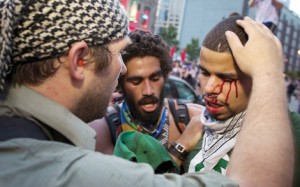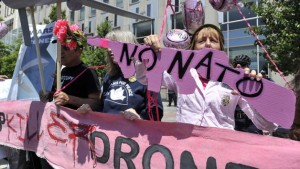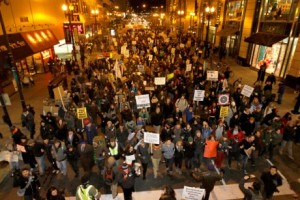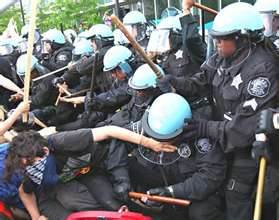By Starla Muhammad -Staff Writer-Final Call
Updated May 22, 2012 – 12:55:40 AM
 CHICAGO (FinalCall.com) – Tension among protestors and Chicago police came to a head toward the end of day one of what was otherwise an animated but peaceful anti-NATO rally and march that took place here, amidst the backdrop of downtown.
CHICAGO (FinalCall.com) – Tension among protestors and Chicago police came to a head toward the end of day one of what was otherwise an animated but peaceful anti-NATO rally and march that took place here, amidst the backdrop of downtown.
Many applauded what was reported as the tremendous restraint of Chicago Police Department handling of the protests. Others complained the tactics used by law enforcement were heavy handed, a scenario many in the Black community are all too familiar with.
At least 45 people were arrested and several injuries were reported, including four police officers, from May 20 clashes.
Law enforcement was in full force, on foot, bicycle patrol and in marked and unmarked vehicles throughout the day and into the evening. Clad in riot gear and wielding batons, the CPD and state police kept a close eye on marchers.
“Today’s march was peaceful with approximately 2,000 people exercising their First Amendment rights. While there have been some scuffles with individual protesters, the Chicago Police Department has acted professionally and with restraint as protesters refused to disperse,” Chicago Mayor Rahm Emmanuel said in a statement.
Sarah Gelsomino, an attorney with the National Lawyers Guild, said though lawyers are still compiling information, in addition to the 45 arrested, on least another 45 protestors injured by police. Many reported baton strikes to the head and closed fists to the face, she said.
“We’ve had people with reports of lots of concussions. We’ve seen many broken bones, stitches to the head, stitches to the lip; those are just the serious injuries. Other people are just kind of bruised and shaken,” she told The Final Call in a telephone interview.
Atty. Gelsomino said contrary to reports, at least 60 people were possibly arrested and though some were released without charges, others have been charged with resisting arrest, disorderly conduct, reckless conduct, failure to disperse and mob action. Mainly misdemeanors, she added. The National Lawyers Guild is a national nonprofit organization of attorneys and legal professionals. The group has represented protestors in various Occupy movements throughout the country and has been actively involved in assisting those arrested during the Chicago NATO protests.
The violence that erupted at the end of the permitted march and was blamed mostly on a group known as Black Bloc, described by many as anarchists. They are known for dressing in all black and instigating violence at otherwise peaceful events, say analysts. Reports said sticks and bottles were hurled at police toward the end of the march.
Chicago police superintendent Garry McCarthy, in talking to reporters, choked up while commending the way officers under his command handled themselves.
“If you think it’s easy to ask people to do what they did, it’s not. Asking people to put themselves in harm’s way knowing that they’re going to get assaulted to be able to stand there and take it, those guys were amazing,” said Superintendent McCarthy.
Atty. Gelsomino, however, said many of the injuries were sustained by innocent protestors not affiliated in any way with Black Bloc.
“The police unleashed indiscriminate violence. There were all kinds of people who saw that. That strike of the police baton,” she said.
The National Lawyers Guild will continue to have legal observers monitor police presence during additional protests scheduled for May 22, the final day of the NATO Summit and subsequent events throughout the week in Chicago, added Atty. Gelsomino.
“We remain hyper-vigilant at this point and have to be prepared unfortunately of more such action from the police. That’s why we have our legal observers on the ground and we will continue to document and record police actions as we go forward here,” she said.
At Final Call presstime, a joint press conference by Occupy Chicago and the Coalition Against NATO/G8 War and Poverty Agenda was scheduled to denounce what they called “the police violence.”
Police officers from as far away as Charlotte, N.C., Philadelphia and Milwaukee joined 3,100 officers from the Chicago Police Department for NATO duty. According to one report, $36.5 million was raised in private donations for NATO-related expenses and the city also received an additional $19 million grant to cover security costs.
The Final Call sent an e-mail to the Chicago police superintendent’s office and called the mayor’s office seeking comments, neither inquiry was returned.
The tens of millions spent to host the summit, while city, state and federal cuts to much needed resources are leaving millions of Americans in a social and economic quandary is what prompted thousands from around the country to converge on Chicago.
There were people from various races, creeds, religions, ideologies and causes, but for the most part many saw eye to eye in their collective cry of dissatisfaction and outrage with the status quo represented by the ultra-rich and powerful entities represented by NATO.
“How do we fix the deficit, end the war and tax the rich,” “Banks got bailed out, we got sold out,” “We are unstoppable, another world is possible,” were just a few of the slogans marchers shouted along the route through the heart of downtown Chicago as many carried homemade signs and posters.
“We’re here because we are part of the 99 Percent. We’re concerned about the communities and the money that’s being diverted away and that the government is saying we need to make all these social cuts in our communities,” said Maria Bell of National Nurses United, a nurses union which also held a protest and rally May 18 in Chicago that drew thousands.
A financial transaction tax would bring billions of dollars into the communities for much needed resources, Ms. Bell said. “If there were a financial transaction tax on Wall Street it could bring $350 billion a year to the United States alone. And if that money was earmarked for health care and education and jobs with justice, all the things our communities need then that would be a good starting point,” added Ms. Bell.
Six of 12 of Chicago’s outpatient mental health clinics closed in April, leaving the 3,000 people they served scrambling to seek help at private clinics, if they have insurance. The closures are estimated to save the city $3 million. The House Agriculture Committee cut $33 billion from the nation’s food stamp program, which millions of low income families still count on.
Overwhelming college debt, an unemployment rate that continues to hover around eight percent nationwide and a crumbling education system could all be fixed with investing instead of cuts and austerity measures argued many protestors.
The housing crisis which saw Blacks and Latinos lose their homes at a disproportionately higher rate than any other group caused the median wealth for both groups to plummet. The median wealth for Latinos declined by 66 percent and Blacks by 53 percent between 2005 and 2009.
“I thought that since international journalists from around the world are here in Chicago, I was hoping to let them know that a lot of the Spanish speaking population, which I’m one of are fed up with the banking system,” said John Viramontes, who was among the protestors.
“I’m here to say that these banks should let these homes go back to the original owners with a reduction in principle,” he said, listing JP Morgan, Chase and Wells Fargo among the list of perpetrators.
Larry “Wolf” Hicks, traveled from Detroit, Mich., a city that has seen its fair share of economic troubles. Financial decisions for the nearly bankrupt city are now being made by a representative from the state of Michigan. The city is facing a $200 million budget deficit.
The dissatisfaction displayed was as palatable as the heat of the 90-degree temperatures reached during the march and while Mr. Hicks said he was not sure if protests would solve any real problems, he said, sitting around doing nothing was worse.
“It’s a bunch of bull crap and if we come together I look at it like this. Ballot by the bullet, any means necessary and like Che Guevera said ‘No concessions to imperialism,’ ” said Mr. Hicks. “Until we come together and fight, we’re not going to get anything right,” said Mr. Hicks.
Even leading up to the protest, those in opposition to NATO said this rally would be important.
Long-time activist Larry Holmes with the World Worker’s Party said global circumstances and those fighting for economic and social justice would make for an important event. “We have a situation where the global capitalist crisis is about to get worse, if that’s possible,” he told a group that convened for a public meeting three days before the main march.
“The underlying reason for that of course is the dire economic crisis that is at this point global and getting worse and how we’re all interconnected. Clearly what happens in Greece effects not only Europe but it affects the United States, Asia and so on,” said Mr. Holmes.
Related story: NATO: Peacemakers or Peacebreakers?








